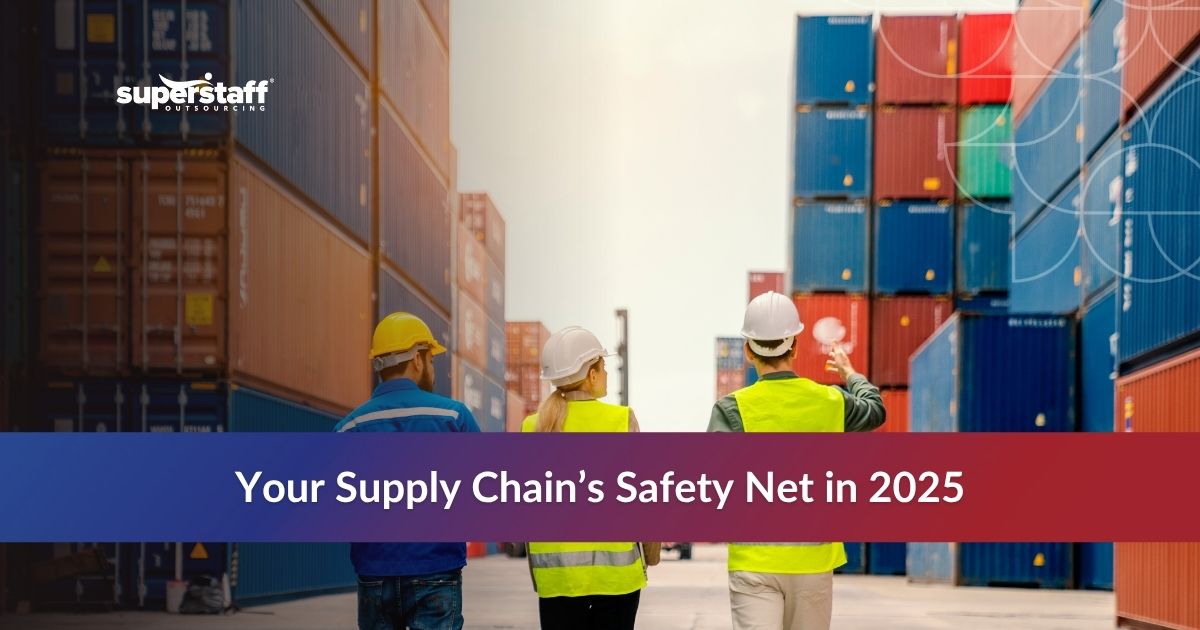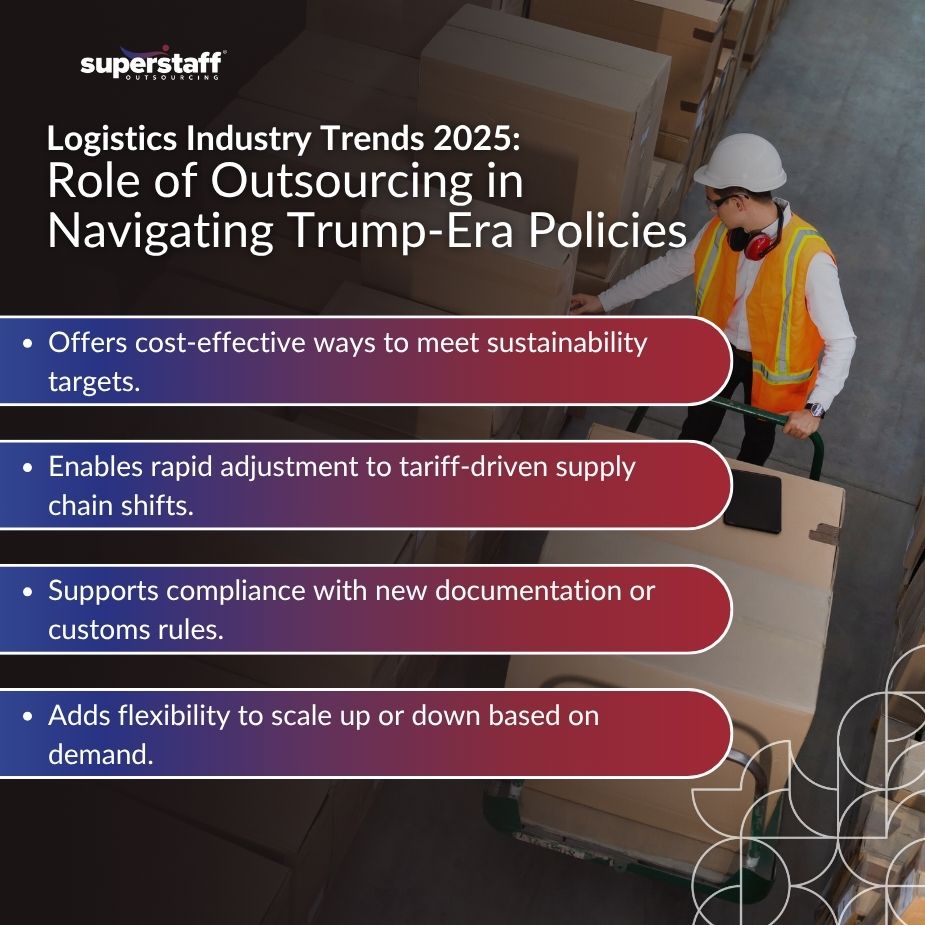
In the wake of President Trump’s return to office, the U.S. logistics sector is bracing for turbulence. From reinstated tariffs to renewed border policies and labor unrest, supply chains are under pressure like never before. Amidst this shifting landscape, companies are scrambling to adapt—and fast.
Logistics industry trends 2025 point to a growing reliance on outsourcing as a critical strategy to weather the storm. It’s no longer just about cost savings. Today, outsourcing is powering smarter, more resilient, and more sustainable logistics operations. By offloading key functions like dispatching, driver support, and track & trace to trusted partners, businesses can maintain service quality, reduce overhead, and stay agile—even as policy changes reshape the playing field.
In this blog, we’ll explore how outsourcing is helping logistics companies boost operational efficiency, build long-term resilience, and support green supply chain goals, right when the industry needs it most.
An Overview of the Impact of Trump Policies on Logistics
The 2025 logistics landscape is shaped by policy volatility, labor issues, and economic unpredictability.
As President Trump reclaims the Oval Office, U.S. transportation and supply chain leaders find themselves navigating a familiar but intensified set of challenges. With a renewed focus on protectionism, tariffs are once again a centerpiece of trade policy, sparking uncertainty among shippers, manufacturers, and logistics providers alike. This policy volatility is just one of several forces reshaping the logistics landscape.
Among the key logistics industry trends in 2025 is the strain placed on domestic infrastructure. Road congestion, port inefficiencies, and limited freight rail capacity are adding friction to already fragile delivery timelines. At the same time, rising labor disputes and an ongoing shortage of qualified drivers are constraining operational capacity, especially in long-haul freight and last-mile delivery.
The result: higher operational costs, unpredictable delivery windows, and growing dissatisfaction among customers. Companies that once relied on stable ground logistics are now seeking agile, cost-effective alternatives. The question is no longer whether to adapt, but how.
Given these challenges, companies are re-evaluating their supply chain strategies, especially around outsourcing.
Outsourcing key logistics functions offers a proven path to cost efficiency and labor stability.
With logistics costs rising across the board, more businesses are outsourcing non-core logistics operations to stay competitive. By turning to global teams, U.S. companies reduce overhead, ensure service continuity, and refocus internal resources on strategic tasks.
Outsourcing dispatching and driver support is one such example. Offshore teams can handle 24/7 communications, schedule coordination, and incident management, freeing in-house staff from round-the-clock stress. Likewise, outsourcing track and trace operations ensures real-time freight visibility without the need for large internal monitoring teams.
Back-office functions like freight billing, documentation processing, and audit compliance can also be seamlessly handled by offshore partners. These tasks are critical but resource-intensive. Offloading them to specialized teams improves accuracy and accelerates payment cycles.
Beyond cost and continuity, outsourcing also strengthens operational resilience.

Global disruptions call for flexible, scalable logistics operations—something outsourcing makes possible.
As trade routes shift and global tensions rise, logistics companies need the ability to scale rapidly and shift gears in real time. Outsourcing logistics support gives companies the breathing room to grow and contract based on demand fluctuations.
For instance, outsourcing enables near-real-time issue resolution across time zones. With dedicated teams working offshore, businesses can respond to customs delays, weather disruptions, or rerouting needs without missing a beat.
Outsourced back-office teams also act as buffers against domestic staffing shortages. Instead of scrambling to recruit and train during peak periods, logistics firms can tap into pre-trained teams ready to support critical functions.
And when geopolitical shifts require swift action, such as rerouting due to port blockades or responding to sudden tariff hikes, offshore partners offer the responsiveness and global awareness needed to pivot efficiently.
Efficiency and resilience are essential, but sustainability is also now top of mind.
Sustainable logistics is no longer a luxury—it’s a necessity driven by consumer and regulatory pressure.
Consumers today demand transparency, accountability, and action from the brands they support. At the same time, regulators are tightening compliance standards around emissions, fuel usage, and reporting. That’s why sustainable logistics practices are becoming a critical differentiator.
Outsourcing logistics operations can play a central role in driving supply chain sustainability with outsourced logistics support. From smarter dispatching systems that minimize empty miles to cloud-based workflows that eliminate paperwork, offshore partners bring innovation and efficiency.
For example, digital route optimization and centralized scheduling handled offshore can significantly reduce fuel usage and emissions. Admin teams can also digitize documentation, helping logistics companies move away from paper-heavy systems that contribute to waste.
Additionally, outsourced teams can consolidate and monitor data for carbon tracking and regulatory reporting. With sustainability KPIs built into daily workflows, logistics firms gain better visibility and accountability.
With the right outsourcing partner, businesses can stay compliant, efficient, and future-ready.
SuperStaff enables U.S. transportation companies to thrive under uncertainty with specialized offshore logistics teams.
Navigating the complexities of today’s logistics environment requires a partner that understands both global operations and U.S. regulatory standards. SuperStaff provides logistics companies with offshore teams tailored to their unique needs, from track and trace and dispatch to billing and sustainability tracking.
Our logistics support agents come with deep domain expertise and receive specialized training to align with our clients’ tools, terminology, and processes. We offer seamless integration with your systems, so outsourced functions feel like a natural extension of your internal team.
Whether you need support during peak seasons or a year-round partner to streamline operations, SuperStaff delivers scalable, high-performance logistics outsourcing solutions. Our custom workflows ensure compliance, efficiency, and measurable outcomes.
As we look ahead, outsourcing is not just about saving—it’s about surviving and growing.
Logistics Industry Trends 2025 Underscore the Value of Strategic Outsourcing Partnerships
Trump-era uncertainties in transportation and logistics make outsourcing a wise, strategic investment.
With tariffs, labor issues, and sustainability demands converging, the need for efficient and adaptable logistics has never been more urgent. Outsourcing logistics operations helps businesses achieve cost savings, operational stability, and environmental goals.
As logistics industry trends 2025 unfold, the companies that thrive will be those that embrace new models of support. From navigating the impact of Trump policies on logistics to implementing sustainable logistics practices, outsourcing empowers firms to stay competitive in a volatile world.
Explore how SuperStaff can help you build a future-ready logistics operation through specialized outsourcing solutions.






